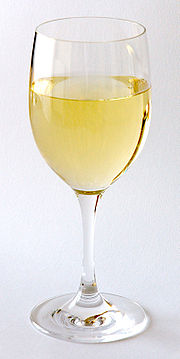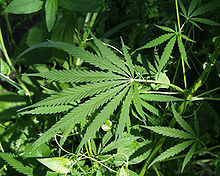- Non-grape-based wine
-
The term wine can sometimes include alcoholic beverages that are not grape-based. This can include wines produced from fruits like apples and elderberries, starches like rice, as well as flowers and weeds like dandelion and marijuana.[1] The most common, narrow definition of wine relates to the product of fermented grape juice, though it is sometimes broadened to include any beverage with a fermentation based on the conversion of a sugar solution into alcohol (fermented beverages based on hydrolyzed barley such as beer are often excluded). Some drinks such as cider, mead and perry are also excluded from this broad definition of wine for historical reasons.[2] In many areas of the world, the commercial use of the word "wine" is protected by law.[3] In the European Union "wine" is legally defined only as the fermented juice of grapes.[1]
Contents
Fruit wine
Main article: Fruit wineFruit wines have traditionally been popular with home winemakers and in areas with cool climates such as North America and Scandinavia. Most fruits and berries have the potential to produce wine. However, the amount of fermentable sugars is often low and need to be supplemented by a process called chaptalization in order to have sufficient alcohol levels. Sucrose is often added so that fruits having excessive levels of acids (usually citric or malic acid) can split the sucrose into fermentable fructose and glucose sugars. Many fruit wines suffer from a lack of natural yeast nutrients needed to promote or maintain fermentation. Winemakers can counter this with the addition of nitrogen, phosphorus and potassium. Unlike some grape-based wines, fruit wines often do not improve with bottle age and are usually meant to be consumed within a year of bottling.[4]
Starch wines
Sake, and other rice wines are commonly described as wine, although the process for making them is different from that of other wines, and indeed more closely resembles the production of beer.
Other wines
In the 21st century there have also been some attempts by Chinese winemakers to make wine from fish. An American winemaker has also produced wine from army worms, which received favorable reviews from some wine experts.[5] In Scotland, one winery has experimented with making wines from vegetables such as carrots and turnip. In the United States, recipes have been published online demonstrating how wine can be made from marijuana by adding winemaking yeast to a boiled mixture of marijuana, honey, lemons and oranges.[1]
Dandelion is a Country wine having Celtic origins, and popular in regions across Europe and the Eastern United States.
There is palm wine from west Africa from palm tree. This is the same tree from which the red Palm oil is obtained.
See also
- Fruit and vegetable beer
- Mead
- List of grape varieties
References
- ^ a b c G. Harding "A Wine Miscellany" pg 5-9, Clarkson Potter Publishing, New York 2005 ISBN 0307346358
- ^ J. Robinson (ed) "The Oxford Companion to Wine" Third Edition pg 768 Oxford University Press 2006 ISBN 0198609906
- ^ George, Rosemary (1991). The Simon & Schuster Pocket Wine Label Decoder. Fireside. ISBN 978-0671728977.
- ^ J. Robinson (ed) "The Oxford Companion to Wine" Third Edition pg 291 Oxford University Press 2006 ISBN 0198609906
- ^ "Army Worm Wine: Reviews". http://www.armywormwine.com/reviews.htm.
Categories:- Wine styles
- Fruit wines
Wikimedia Foundation. 2010.


